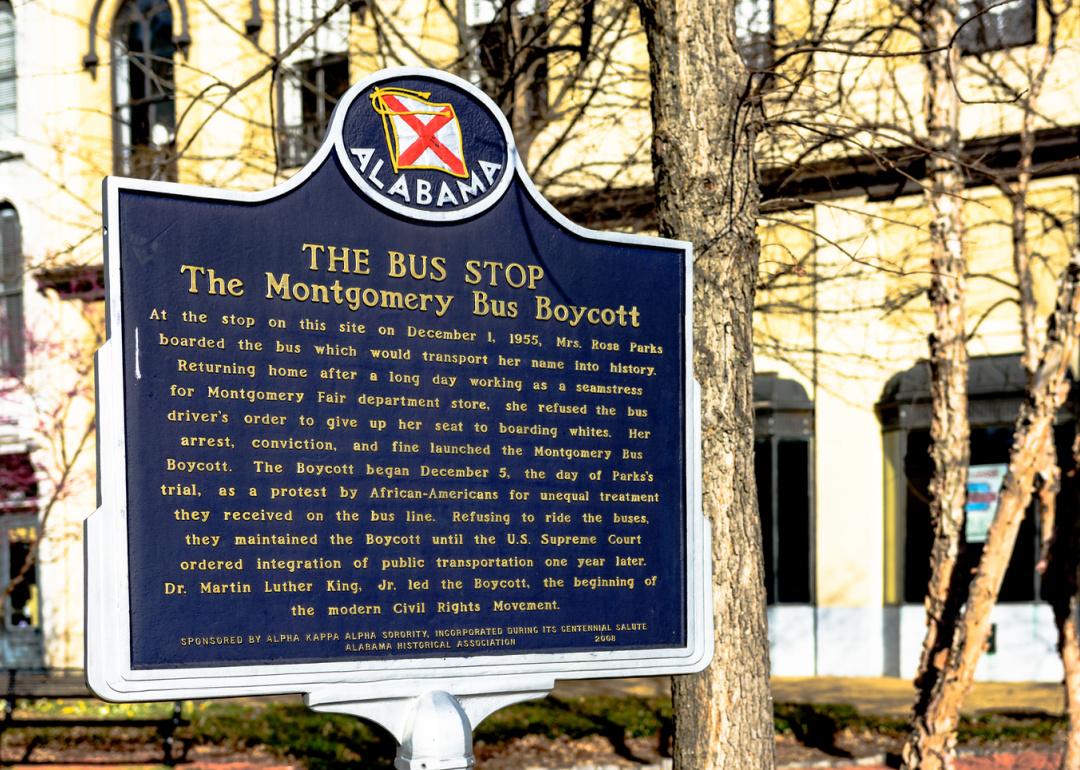
Explore historic sites commemorating Black history in Massachusetts
Explore historic sites commemorating Black history in Massachusetts
The legacies of influential Black Americans have not always been acknowledged, so it's not uncommon that modern-day residents may overlook the historic sites of their own cities.
While some historical Black figures in the U.S. are more well-known than others, there are in fact thousands of people dating back generations to 17th-century slavery who left traces of their visions and impacts all across the country. Whether prominent figures such as Robert Abbott, who founded one of the largest African American newspapers in the country, or more under-the-radar originators such as Obrey Wendell Hamlet, who cultivated unique vacation experiences in the Rocky Mountains, one thing's for certain: There is far more uncharted Black history in this country than charted.
Stacker identified historic sites commemorating Black history across 47 states, using the National Register of Historic Places. North Dakota, Vermont, Hawaii, and Wyoming did not have Black historic sites listed on the registry. While some states, especially in the South, are home to many sites central to the civil rights movement, Stacker listed the total sites in every state and the names of three historic sites where available. You can visit the full registry of 232 historic sites and explore the Civil Rights Trail to learn about additional locations across the U.S.
Read on to explore and learn about the historic sites celebrating Black history in your state, or read the national story here.
Massachusetts by the numbers
- Sites commemorating Black history: 33 (6 with state significance, 9 with national significance)
- Du Bois, William E.B., Boyhood Homesite (Great Barrington)
- Cuffe, Paul, Farm (Westport)
- Johnson, Nathan and Mary, Properties (New Bedford)
The W.E.B. Du Bois Boyhood Homesite celebrates the life and legacy of civil rights activist and thought leader, W.E.B. Du Bois, the first African American to obtain a Ph.D. from Harvard University. The property, which had been in Du Bois' family for over 100 years, was given to him as a gift on his 60th Birthday in 1928.
Continue reading to see which sites commemorate Black history in other states in your area.
Connecticut
- Sites commemorating Black history: 18 (11 with state significance, 2 with national significance)
- First Church of Christ (Farmington)
- Prudence Crandall House (Canterbury)
- Boce W. Barlow Jr. House (Hartford)
Created in 1926, Boce W. Barlow Jr. House was home to Boce W. Barlow Jr., who had a knack for making history. Barlow was not only the first African American judge in Connecticut in 1957, but he also became the state's first Black senator in 1966. Barlow purchased the home in 1958 and moved in with his wife, Catherine Barlow. They were the first Black family to move onto Canterbury Street.
New Hampshire
- Sites commemorating Black history: 1 (1 with state significance, 0 with national significance)
- Freewill Baptist Church-Peoples Baptist Church-New Hope Church (Portsmouth)
This historic landmark is noted for being New Hampshire's first church building owned by a majority-Black congregation. For years, the church was the center of Portsmouth's spiritual, civic, and social life. Among the church's most renowned visitors was the Rev. Dr. Martin Luther King Jr., who preached there in 1952.



